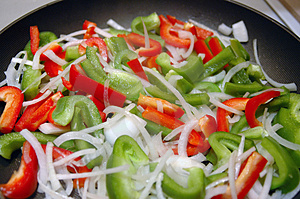by Michelle Sutton-Kerchner
Two million heart attacks and strokes. 800,000 deaths. Each year. There lies the heart health of America. How is your heart? Keep it beating happily …
Heart health encompasses many cardiovascular illnesses. It includes major events, like heart attack and stroke, as well as conditions that contribute to their risk, like high cholesterol and blood pressure. Heart failure, irregular heartbeat, improperly functioning heart valves, and clogged arteries are the most frequent conditions.
Do What You Can
A family history of heart disease or its risk factors is an inescapable reality. Some genes are simply inherited. Along with sparkling eyes, you may have been passed a worrisome cholesterol level or history of heart failure. To use a cliché– Don’t have a heart attack! A healthy lifestyle can often defy fate.
We admit, sometimes begrudgingly, much of life is out of our control. You cannot shelter yourself from the seasonal cold, a random accident, or company layoffs. Yet, we can– and do– take preventative measures. You may still catch that cold, but the impact might not be as bad. Just as you’d likely avoid long lunches during a company downsizing effort, you should especially avoid cigarettes when you have other risk factors for heart disease. Be proactive with the rest of life’s equation. Work beyond genetics by improving elements such as diet, exercise, and overall lifestyle.
Fact: Exercising 30 minutes daily decreases your risk of heart disease.
Fact: Every hour of walking may increase life expectancy by two hours.
Anything counts. Avoid the all-or-nothing approach. If you don’t have 30 or 60 minutes, fit in what you can. It’s better than nothing.

The American Heart Association recommends 150 minutes of moderate exercise or 75 minutes of vigorous (or a vigorous-moderate combination) per week. Strive for at least 30 minutes a session, with a backup plan of 10- or 15-minute segments. Aerobic exercises directly benefit the heart. Strength and stretching exercises build stamina and flexibility. The heart is one muscle you want to strengthen!
Nourish Your Heart
Override your gene’s with a heart-healthy diet. It can be done. According to research published in the peer-reviewed journal PLoS Medicine, a diet heavy in raw vegetables and fruits can counteract chromosomal variations linked with heart issues. Don’t take a doomed approach and binge on bacon because your family history dictates you’re “going to have heart failure anyway.”
Rich in antioxidants, berries are especially heart friendly. They are known to lower blood pressure and boost good HDL cholesterol. Dark fruit, such as blueberries, raspberries, and cranberries, are gaining popularity for their ability to prevent high blood pressure. Foods high in soluble fiber minimize absorption of bad LDL cholesterol, which helps keep arteries unclogged. Fruit, veggies, and whole grains like brown rice, corn, oats, and popcorn do the job.
Your Heart’s Desire
Surprising new discoveries for a healthy ticker have been made, in addition to traditional fitness and nutrition recommendations. You’ll love these findings:
Laugh: A hearty chuckle that grips your entire physical and emotional being is best. Negative emotions cause blood vessels to restrict blood flow. Clearly, stress has a profound effect on the body in this aspect and many others. Recent research takes the theory a step further.
Positive emotions actually lead to better blood flow. Findings were presented at the European Society of Cardiology Congress 2011 in Paris (August). Participants were shown clips from humorous movies and stressful movies, which resulted in a difference of 30 to 50 percent in blood vessel diameter. Help your blood flow more freely by saturating yourself in happy thoughts. “Eat your veggies, exercise, and get a good belly laugh every day,” concluded Dr. Michael Miller, Professor of Medicine and lead investigator.
Do what it takes to put a smile on your face.

Fry Foods: Any health-conscious individual would find this unbelievable. Yet, research in the BMJ, formerly British Medical Journal, (January 2012) discovered eating fried foods did not increase the risk of heart disease. However, it is essential to fry food in olive or sunflower oils. The study was conducted in Spain, not with the typical American diet.
If you fry, avoid using oils high in trans fats, which surely have an adverse effect on heart health. If the substance stays solid at room temperature, like butter, lard, or shortenings, imagine how it will be in your arteries.
Toast: The heart benefits of red wine continue to be praised. Go for the actual alcoholic drink as opposed to dietary supplements. Trends indicate the alcohol itself contributes to the health perk, along with the compounds in red wine. Moderation is essential. If you go beyond the ideal amount of one drink daily for women and two for men, you could easily reverse the positive results.

Indulge in Dark Chocolate:
Flavonoids found in dark chocolate can lower bad cholesterol, reduce blood pressure, and prevent blood clots. According to the BMJ (August 2011), regular chocolate consumption was associated with a 37 percent decrease in heart disease risk and a 29 percent decrease in risk of stroke.
Dark chocolate also tends to satisfy one’s craving for both sweet and savory. Let’s not forget what it does for our smile. (Can it be considered a stress-reliever?) One morsel really multitasks. All things in moderation though. It is still highly caloric and loaded with sugar.
Sprinkle with Salt: New research eliminated a connection between salt intake and cardiovascular problems in healthy individuals with normal blood pressure and ideal weight.
For those who already have heart disease, a high-sodium diet has been proven to raise the risk of heart attack, stroke, and fatalities.
Strike a Pose: Yoga is proven to reduce stress and blanket the body and mind with peace. Taken one asana (yoga-talk for “position”) further, a regular yoga practice is associated with decreased episodes of irregular heart beat.
The quality-of-life for those with abnormal heart rhythms substantially improved through a commitment to yoga. According to research presented at the American College of Cardiology’s 60th Annual Scientific Session (April 2011) , episodes of irregular beating were cut in half.
Some elements remain dangerous to the heart and overall health. Excessive body weight, inactivity, cigarette smoking, and too much alcohol cannot be justified in any study. Do what you can to eliminate these from your lifestyle. All of the aforementioned findings apply to the already heart-healthy individual. Those with other risks need to improve before given a permission slip for life’s little indulgences.
Broken Heart Syndrome

More women die of heart disease than all forms of cancer combined. Traditionally associated with the overworked, stressed businessman, heart attacks kill women as well. Symptoms of heart disease present differently in women. Know the signs and take action.
Broken Heart Syndrome is a substantiated phenomenon that occurs when an intense period of stress or loss leads to heart failure. The American Heart Association recently revealed women are seven to nine times more likely to experience Broken Heart Syndrome than men. If you notice a sister, mother, or girlfriend suffering from a severely broken heart, take it seriously. The emotional effects can be devastating to the physical heart.
Acknowledge the Whole
Many general health issues relate to heart health. The obvious include cholesterol level, blood pressure, and fitness level. Other factors also have an effect, including seemingly unrelated diseases like diabetes and HIV. These extensive factors contribute to the heart’s ability to function. With so much affecting the heart, it is understandable why heart disease is a leading killer in the United States.
Visit the American Heart Association’s Web site (www.heart.org) for the latest findings and valuable tools, including fact sheets and assessment risk worksheets. Extensive information on how to avoid cardiovascular events and heart disease is available.
Enjoy the benefits of a healthy diet, consistent exercise, and a hearty laugh. When it comes to your health, a proactive approach leads to prevention.
Sources
“Heart Health: 13 Foods with Cardiovascular Benefits,” by Sarah Klein at www.huffingtonpost.com.
“Heart Health Month: 8 Surprising Heart Facts We Learned Over the Last Year,” by Sarah Klein at www.huffingtonpost.com.
Image Credits
Laughter (introductory photo): http://www.flickr.com/photos/67556213@N07/6434113071/
Fried veggies: © William Freeman at www.dreamstime.com.
Chocolate heart: © Norlito Gumapac at www.dreamstime.com.
Broken heart: http://www.flickr.com/photos/26015375@N06/6199016157/
 Fitness & Wellness News Your Source for Fitness News, Wellness News, Health News, and Nutrition News!
Fitness & Wellness News Your Source for Fitness News, Wellness News, Health News, and Nutrition News!



